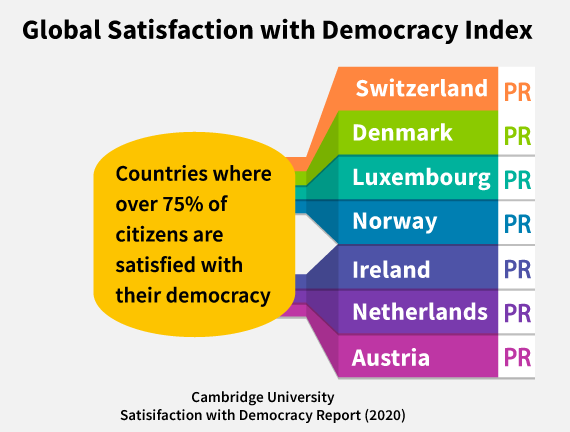It would be good to explain every abbreviation at least once.
Fairvote Canada
What is This Group is About?
De Quoi Parle ce Groupe?
The unofficial non-partisan Lemmy movement to bring proportional representation to all levels of government in Canada.
🗳️Voters deserve more choice and accountability from all politicians.
Le mouvement non officiel et non partisan de Lemmy visant à introduire la représentation proportionnelle à tous les niveaux de gouvernement au Canada.
🗳️Les électeurs méritent davantage de choix et de responsabilité de la part de tous les politiciens.

- A Simple Guide to Electoral Systems
- What is First-Past-The-Post (FPTP)?
- What is Proportional Representation (PR)?
- What is a Citizens’ Assembly?
- Why Referendums Aren't Necessary
- The 219 Corrupt MPs Who Voted Against Advancing Electoral Reform
Related Communities/Communautés Associées
Resources/Ressources
Official Organizations/Organisations Officielles
- List of Canadian friends of Democracy Bluesky
- Fair Vote Canada: Bluesky
- Fair Voting BC: Bluesky
- Charter Challenge for Fair Voting: Bluesky
- Electoral Renewal Canada: Bluesky
- Vote16: Bluesky
- Longest Ballot Committee: Bluesky
- ~~Make Votes Equal / Make Seats Match Votes~~
- Ranked Ballot Initiative of Toronto (IRV for municipal elections)
We're looking for more moderators, especially those who are of French and indigenous identities.
Politiques de modération de contenu
Nous recherchons davantage de modérateurs, notamment ceux qui sont d'identité française et autochtone.
The United States has PR too. Puerto Rico.
How does Pull Request translation to satisfactory… OOOH…
I see the PR jokes but I still don't know what it means in this context
Proportional representation is my guess?
I hear people with cars enjoy more ice cream.
Isn't this just cherry picking? Where's Germany
Advocates of proportional representation (PR) often cite its potential for increasing citizen involvement in politics as one of PR's fundamental advantages over plurality or first-past-the-post systems. The assumption is that plurality electoral systems distort the translation of votes into seats, discouraging and alienating small party supporters and other political minorities. In contrast, PR systems are believed to provide greater opportunities for representation which are assumed to instil greater efficacy and increase participation. We examine this theory linking institutions to electoral participation across a diverse set of countries using data from the Comparative Study of Electoral Systems. Using a multi-level approach we find evidence consistent with the expectations about the negative influence of disproportional systems on political minorities. Voters are also likely to have stronger partisan preferences in PR systems, which enhances political efficacy and increases voter participation. The effects of PR, however, are not all positive; broad coalitions, which are likely to be a feature of these systems, reduce political efficacy.
You might need to bend a knee to explain how that answered my question
The paper was published in 2008 and I don’t know enough about European politics to know the shifts since then but you can download it here.
Looks like they categorize Germany as MMP (“Germany, New Zealand and Mexico also have a mixed member proportional (MMP) system, where about half of the members in parliament are selected by closed party lists to correct partisan imbalances resulting from the election of electorate candidates by plurality rules”).



Ah I see, that makes sense, cheers for this. I never knew that despite living there for many years. It really did seem like your vote counted directly towards both party and candidate - didn't realise MMP isn't under the umbrella of PR
More people vote under pr thus increasing interest in democracy. People tend to vote more when their votes actually count for the smaller parties / independents.
To your point on Germany, there’s much more involved in having a robust democracy than simply an electoral system. The culture of the society is one.
But you’re from lemmy.ml, so you’re just trying to sabotage democracy any chance you can get.
(oh wow, no I was asking an honest question and ml was the instance first offered to me, jesus)
In Germany, I'm seeing lots of people vote tactfully to keep the AfD out which seems to be a new trend, so I'm not sure how robust PR is in the long run there. Still better than FPTP, of course.
I thought SV countries would be higher
